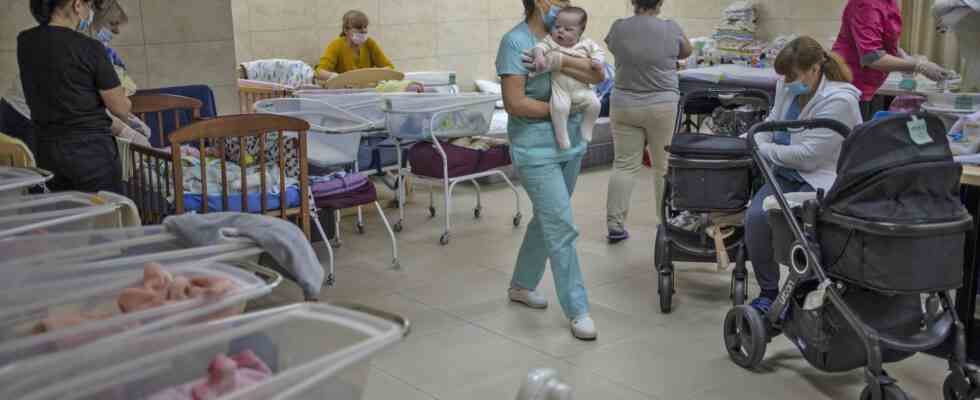Status: 11.04.2022 4:48 p.m
About 2000 children are born to surrogate mothers in Ukraine every year. During the war, it is difficult for foreign parents to pick up the babies – and the surrogate mothers also face complicated questions.
“My little bunny! Yes, you are my little bunny,” nurse Svetlana whispers in a soft voice into a baby’s ear. Several prams are distributed in the brightly tiled room in the Ukrainian capital of Kyiv, and cots are lined up against the wall. There is no window. Seven babies, most only a few weeks old, are cooing and squawking in these basement rooms. For security reasons, the exact location should remain secret. Ukrainian women carried the babies as surrogate mothers. Most children were born after Russia invaded Ukraine. Her parents live in China, Germany or Italy – but so far the war has blocked the way to their children. A boy, whom they call Valeriy here, has not been able to be picked up by his Chinese parents for several months: First came the Corona crisis, then the war.
Instead, for example, nurse Svetlana and nurse Irina take care of the children. Both only want to see their first names published. For weeks, the two have been with the babies around the clock, working in shifts with other nurses. “We try to give them the warmth that they would otherwise get from mom and dad,” says Svetlana. She and Irina decided not to flee – even when there were explosions and rocket alarms outside. “My colleagues are younger and have their own little children,” says Svetlana, a woman in her 50s. “If I didn’t take care of the babies, who would?”
Ukrainian surrogate mothers and the uncollected babies
Mareike Aden, Anastasiia Obraztsova, NDR, Weltspiegel 6:30 p.m., April 10, 2022
“I was afraid of harming the child”
At times there were more than 20 babies waiting in this basement alone – and the surrogate agency operates another basement to keep the children safe. Since the Russian army at least left Kyiv, more and more parents are now making the journey to their child and a bit of routine is returning to the Ukrainian surrogate mother industry.
In a Kiev clinic, examinations for surrogate mothers are scheduled for the same morning – for the second time since the Russian invasion. The clinic is owned by BioTexCom, the largest in the country in the industry. Investigations were already underway in Ukraine against the founder Albert Totschilowskyj, among other things for human trafficking and tax evasion. However, business has been going well for years.
That morning, more than a dozen women come for the scan, including Anastasia. She doesn’t want to give her last name, but she says that she is raising two children alone and works as a hairdresser. With the money she gets for surrogacy for a Bulgarian family, she wants to lay the foundation for an apartment. When she talks about the first days after the Russian attack, she begins to cry: “My mother kept wanting us to flee. But I was afraid of harming the child.” She felt safer at home.
Some surrogate mothers fled to Poland
Being pregnant during the war, and then also as a surrogate mother, is an extreme burden, says a woman named Irina. She’s carrying the child of an Israeli couple – and panicked when she couldn’t reach anyone from the company for a few days after the invasion. “I thought: What now? I have two children myself. What do I do with a third?” She says. “We were also told that we were not allowed to keep them, that we would otherwise be liable to prosecution.” Both women ask themselves: What will the situation be like when the birth is due in a few months?
Now that the panic of the first few weeks has passed, everything is under control, says the company’s medical director, Ihor Pechenocha – including the problem with the ten surrogate mothers who fled to Poland. They couldn’t stay there anyway, because surrogacy is forbidden in Poland. “I have their promise that they will return to Ukraine in the 28th week,” he says. From this point in time, a born child can be viable.
Hand over babies directly at the platform
After Corona, this is now the second crisis for the surrogate mother industry in the country: At the peak of the pandemic, around 100 babies had to be looked after temporarily in a hotel room. “At that time there were quarantine and entry rules, but now fear is keeping parents from coming here,” says Pechenokha. “I bow to everyone who came despite the shelling and air raid alarms. We handed some babies over to the train station directly on the platform.”
The Ukrainian authorities have simplified the bureaucratic processes to make it easier to pick up the children. The clinic is now examining whether it can continue to work from Ukraine or at least move part of the business to another country.
The two carers Swetlana and Irina are certain that they will continue to look after the babies in the basement – those who are there and all those who are yet to be born. No matter how the war goes on.

